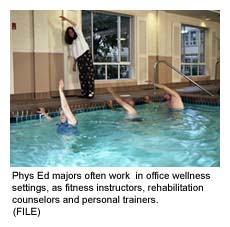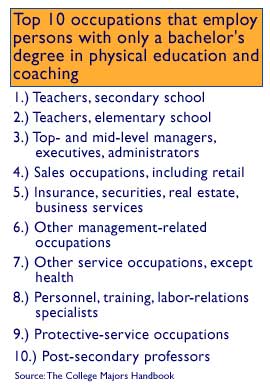NEW YORK (CNNfn) - Christine Eley is not the office type.
The 1995 graduate of Arizona State University began her college career as a computer science major, but shifted gears mid-way through after taking a long hard look at what her future had in store.
"I decided I didn't want to sit at a desk all day long," Eley, now 30, said. "I was into riding bikes and racing at the time and I thought about the things that I like to do and do well. I decided to learn more about the human body and what makes people go."
She switched into the physical education program with a concentration into corporate wellness shortly thereafter, a major that incorporated many of the chemistry and calculus classes she'd already completed as a comp sci major.
Now, Eley's the one making people go. As the wellness center supervisor for Motorola Computer Group in Tempe, Ariz., she's in charge of organizing aerobics and health programs, equipment training, health screening, and maintaining the company's membership database - among other responsibilities.
 "Computer science wasn't going to fit my personality," she said. "There's a people element that this job has that working at a desk writing database modules does not. I like that I can be out on the floor talking to people and helping them. " "Computer science wasn't going to fit my personality," she said. "There's a people element that this job has that working at a desk writing database modules does not. I like that I can be out on the floor talking to people and helping them. "
The tough sell
To some, the concept of majoring in physical education may sound elementary - like the standard grade school quip that recess ranks as a student's "favorite subject." And to the parents of college-bound kids, who are concerned about where their child's education will lead, it can be a tough sell indeed.
But Elaine Auld, executive director of the Society for Public Health Education in Washington, said that's because Phys Ed is one of the most misunderstood majors in the system.
"I never knew this career option existed myself," she said. "A lot of guidance counselors, who might suggest teaching or nursing degrees [to students interested in sports and fitness], aren't even aware of it. There are emerging career opportunities as a health educator."
Among them, Phys Ed grads, like Eley, often land jobs in office wellness settings as fitness and health managers. Others work as rehabilitation counselors, personal trainers, laboratory assistants and coordinators of patient education and community outreach programs for hospitals and other health care providers.
"Many large companies these days offer fitness centers and may offer classes on stress management and immunizations, all of which are designed to keep workers healthy [and cut health insurance costs down to size]," Auld said.
Auld notes that some, too, go on to become athletic directors for school systems and organizations like the YMCA.
Visit CNNfn's Career page regularly to read "Working your Degree," a new column that highlights job opportunities for a different college major each week. Click here for a list of previous profiles of the accounting, biology, political science, engineering, economics, and computer science, physical therapy, history and teaching professions.
Science, science and more science
Contrary to its perception, Phys Ed is a tough degree that is in no way "elementary" in its course load requirements. Classes for nearly every Phys Ed program include kinesiology, chemistry, calculus, anatomy and physiology.
Many programs also allow students to specialize in either teaching or health and wellness. Some also offer condensed master's degree professional programs that include sports medicine and physical therapy.
(Click here for a previous "Working Your Degree" column on the job market for physical therapy grads.)
"You have to take all the same classes as the students going into premed," said Pat Van Volkinburg, chairwoman of the physical education department at the University of Michigan in Ann Arbor. "The only thing missing is the  pharmacology and the EKG course. It's a hard science degree that includes teaching methodology classes." pharmacology and the EKG course. It's a hard science degree that includes teaching methodology classes."
(Click here for an earlier "Working Your Degree" column on teaching.)
Despite all the emerging new career options for Phys Ed majors, however, roughly half (47 percent) of those who graduate with a bachelor's degree in physical education ultimately end up in education, according to The College Majors Handbook, published by JIST Works.
Often times, in fact, grads with other degrees return to the classroom to pursue a new direction.
"A lot of students sometimes pursue more of what their parents wanted them to," said Linda Rikard, a professor and director of the teacher education program for health and physical education at George Mason University in Fairfax, Virginia. "But we get a lot of students coming back after military service or changing careers who decided to do what they want to do, which is teaching health and physical education in school. They come back to certify in this field."
The Bureau of Labor Statistics reports that teaching positions in the elementary and secondary school levels, are projected to grow 10 percent to 20 percent through 2008. That growth is being driven by the large numbers of Baby Boomer generation teachers who are set to retire.
But the Bureau also notes some fields are more saturated than others - including physical education.
As for those who opt not to teach, The College Majors Handbook finds more than 30 percent work for private institutions, not necessarily related to their field of study, and 11 percent are self-employed as personal trainers and consultants and the rest work for nonprofits, the military or government.
As many as 40 percent with a bachelor's degree in Phys Ed, break from the pack altogether to pursue an unrelated line of work. The reason most often cited include "poor pay" and insufficient opportunities for promotion in their field, The College Majors Handbook reports.
Paycheck check-up
As for salaries, well, let's just say this isn't the kind of degree that will make you rich - unless you choose to go on for a specialty degree or land a top-level managerial post at some point in your career.
Graduates with an undergraduate degree in Phys Ed bring home an average of $40,200 per year, which is 17 percent below the average for all bachelor's degree holders, The College Majors Handbook found.
Those age 20 to 25 average about $30,200 per year, and those in the age 50 to 55 bracket earn about $49,800. Not surprisingly, the Handbook further points out that grads in the private, for-profit sector earn about $44,000, compared with teachers who make just over $36,000 annually.
Van Volkinburg, however, of the University of Michigan, said Phys Ed grads who receive a master's degree in teaching in her school district can eventually earn up $50,000 to $60,000.
"It's not a lot, but it's job satisfaction," she said. "You may be changing the lives of children."
Is Phys Ed right for you?
Deciding whether Phys Ed works for you, all comes down to personal choices. Consider whether teaching or any of the other job options interest you, and also factor in the salary you may be giving up by not choosing another major.
"The first thing that comes to people's minds [when they consider majoring in Phys Ed] is that you're going to be stuck teaching physical education in school or become a personal trainer," Eley, of Motorola, said. "There's that perception, but there's really a wide variety of things you can do."
She notes some of her classmates who focused on a teaching career, have since gone back for a few extra courses that allow them to teach another specialty on the elementary or secondary school level, including biology.
"With all those science classes it's easy to switch over to teaching biology," said Eley, who has just completed her master's thesis and hopes to obtain the higher degree in May. "Some also go to work for parks and recreation services and some actually do open their own business as a personal trainer." 
-- Click here to send e-mail to Shelly K. Schwartz
|

